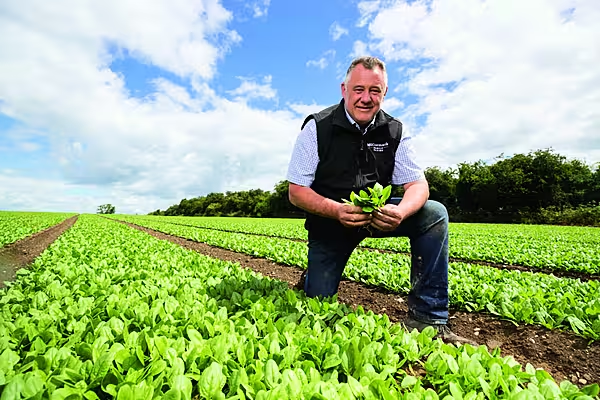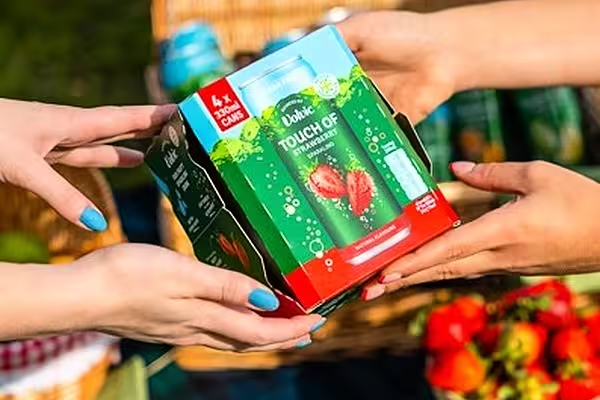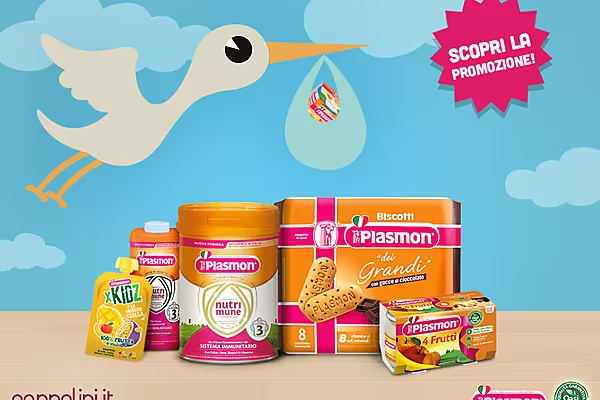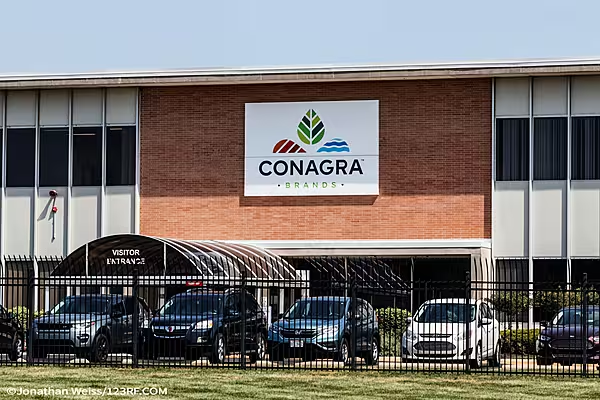In this month’s Meet the Makers profile, in partnership with Love Irish Food, Stephen McCormack, managing director of McCormack Family Farms, talks to Maev Martin about their commitment to growing organic produce, supporting healthy eating, their ‘honest leaf ethos,’ and the importance of precision farming and automation.
McCormack Family Farms began trading back in 1984, when Stephen’s father and mother took the brave step of starting a small business that focused mainly on growing broccoli, iceberg lettuce, and rhubarb.
However, it wasn’t until around 1999 that things really started to change for the business.
The Celtic Tiger era began, with hotels and restaurants opening up everywhere.
Chefs from around the world came to work in Ireland and began requesting different items like herbs and baby leaves.
When he visited the Dublin market every day, Stephen’s father was approached by wholesalers asking if we could grow various products.
Within a two to three year period, the business gradually transitioned from growing vegetables to focusing solely on baby leaves and herbs.
Fast forward 23 years, and they now have an impressive operation with 280 hectares of outdoor farming and four hectares indoors.
McCormack Family Farms has an AA grade from BRCGS, the leading provider of global supply chain assurance programmes, and the business is also certified by Global G.A.P., an international standard that promotes good agricultural practices.
Their Gold Membership with Origin Green demonstrates their commitment to sustainability and showcases their accomplishments.
“Additionally, we have specific certifications such as Marks & Spencer’s Select Farm Produce and Tesco Nurture, among others,” says Stephen.
“When it comes to our Irish-grown produce, you’ll find the Bord Bia Quality Assurance logo on our packaging.
"This logo sets us apart on supermarket shelves, as we are the only nationwide brand in our category that carries this accreditation.
"Accreditations are all about ensuring food safety, which is our top priority as growers of ultra-fresh produce with a short shelf life.”
Import Replacement
McCormack Family Farms is keen to grow products that are traditionally imported.
“The majority, around 90%, of what we grow is focused on competing with imports, and one of the most important aspects for me is to proudly display ‘Origin: Ireland’ on our packaging,” says Stephen.
“Competing with imports can take time. If a new product is already being grown by others, they may have a head start of a year or two.
"They’ve already gone through the process of growing the product, packaging it, and gaining a complete understanding of it.
"For us, we need to learn all of this first. We conduct trials to see if we can successfully grow the product, and only then can we decide to move forward and introduce new crops to the market.
"Some crops perform well and make it to the shelves of our customers, while others may not meet our expectations.”
Going Organic
Last year, the business took a leap and started growing organic produce, dedicating 11 hectares to growing organic baby spinach.
For the past six years, McCormack Family Farms had been importing organic spinach and packaging it on the farm for their retail customers.
“We had managed to build a nice volume, but it felt like the right time to grow our own Irish product for the local season,” he says.
“So far, things have been going well on the growing side, but we faced some challenges with pests, resulting in crop losses.
"However, this year we’re implementing insect netting to try and prevent pest attacks.
"It’s definitely a significant investment, and sometimes that will not bring immediate financial gain, but I believe that this is the right direction for us, our customers and the consumers.
"I love a good challenge, and I’m hopeful that we’ll continue to improve our pest prevention methods.
"With determination and perseverance, we’ll find ways to overcome these obstacles and thrive in organic farming.
"We are already converting another 15 hectares and I think that demonstrates our commitment to growing organic.”
Getting Listed With Retailers
Securing a spot on retailers’ shelves is no mean feat, especially in the fresh produce category.
“We invest a lot of time and effort in new product development, including design and recipes,” he says.
“Sometimes, it can take up to two years to get a new product listed.
"Retailers want to assurance that it will sell well, and they’re right.
"Introducing something new can be a costly mistake if the public doesn’t embrace it, so we need to ensure that it is the right fit within the category and work with our retail customers to support the product throughout its lifecycle.
"For some brands, it’s easier to stick with familiar options by simply copying and pasting a pack or product.
"However, for us to stand out it is important to offer something different, whether it’s Irish-grown produce or a seasonal offering.
"We understand the importance of both affordability and uniqueness in attracting customers.”
Healthy Eating
Helping consumers to eat healthier is at the core of McCormack Family Farms activities.
“Our Salad Creator, a recent addition to our website, has been met with an overwhelmingly positive response, with many individuals expressing how it has positively impacted their ability to manage their protein and fibre intake.” he says.
“We understand that many consumers often struggle with ideas for healthy meals and want to understand the nutritional impact of their food choices.
"To address these challenges, we collaborated with food innovation and food science students from TU Dublin to develop a user-friendly tool called The Salad Creator, which simplifies the process of crafting a delicious and balanced salad-based meal in just a few easy steps.
"We’ve included a convenient calculator that allows users to see how different ingredients influence the nutritional composition of their meal.
"This mobile-first tool utilises the NutriScore system to offer basic guidance, while still allowing consumers to customise their ingredient choices.
"We’re delighted that this tool is helping people make healthier food choices while enjoying the process of creating their own personalised salads.”
Washed Or Unwashed Greens?
According to Stephen, trade data reveals a slight consumer shift from baby leaf towards whole head lettuces.
“There are two primary reasons behind this – trust and value for money,” he says.
“Our research indicates that consumers have less confidence in baby leaf products, often complaining about poor quality and short shelf life.
"This is where we come in! We proudly emphasise our ‘honest leaf’ ethos in our communication.
"This means that our leaves are unwashed, in their most natural state, resulting in a product that isn’t treated with chlorine and stays fresher for longer.
"This is excellent news for consumers as they can enjoy a higher quality product. Plus, it benefits our retail customers too, as our exceptional product helps draw shoppers back to the baby leaf category.”
According to Stephen, when it comes to growing baby leaves, the trend in Europe has always leaned towards unwashed produce.
However, trends evolve, and convenience has taken over, with ‘ready-to-eat’ washed options.
“Nevertheless, there’s still a place in the market for unwashed greens, especially for growers like me,” he says.
“Selling unwashed greens allows me to supply directly to retailers, from farm to bag, without any additional handling or processing.
"Not everyone may be aware that chlorine is used in the washing process of salad leaves.
"While it’s obviously not harmful to humans in this concentration, a lot of people prefer to avoid it.
"And there is the environmental cost of using this chemical in the production process.
"Additionally, our research suggests that for a significant proportion of consumers, the convenience of using washed salad leaves is what we call ‘false convenience’.
"Over half of respondents told us that they wash all salad leaves at home before consuming, whether they are packed washed or unwashed.
"So unwashed leaves seem to be a no brainer – longer shelf life, less food waste, no chlorine, and a more natural, great tasting product.”
Fruit & Veg Shortages
Dr Richard Hackett, a consultant with the agriculture and food development agency in Teagasc, told The Pat Kenny Show on Newstalk last month that heavy rain earlier in the year, followed by a spell of hot weather, has impacted on growth levels.
He is warning that there will be a shortage of home-grown fruit and vegetables for the rest of the year.
Apart from the weather, he said that the big problem is that vegetable and potato growers are ‘not in a position to take on the pressures that weather comes with in the present time.’
“He is absolutely right,” says Stephen. “Like many other growers, we also faced delays in getting our crops planted or sowed, but we’re confident that the crops will catch up and the season will eventually kick off.
"The real concern arises when we don’t have enough early crops for the summer, which forces us to rely on imports from Europe.
"Unfortunately, this can lead to an excess of products in Ireland during late June and July, resulting in lower prices.
"Dealing with high volume but low prices is a significant issue to tackle.
"It’s not exactly what we were hoping for, especially considering the extreme weather conditions we experienced, ranging from heavy rainfall to intense drought.
"The absence of early crops and increased costs have added to the challenges we face.
"However, this is just another challenge that we’re accustomed to as growers and it’s part of the financial risk that we take.
"Every year, there’s an event that impacts growing, such as a hailstorm or flood that can wipe out a lot of crops in a short time.
"While it’s out of our control, we’re determined to move forward.
"It’s important to note that consumers often don’t see these behind-the-scenes challenges.
"They simply expect to find Irish products on the supermarket shelves.”
Precision Farming And Automation
The McCormack Family Farms business is centred around minimising or eliminating imports and prioritising local growth.
“However, we do face limitations, such as land availability, planting capacity, and labour resources,” he says.
“Fortunately, there is a wide array of technology available to help us overcome these challenges, benefiting both efficiency and the environment.
"Currently, we utilise a diverse suite of tools in our farming practices.
"Moisture sensors, for instance, enable us to optimise irrigation and provide precise amounts of water to our plants, reducing water waste.
"Modern equipment for sowing, planting, and harvesting allows us to achieve significantly higher yields than would have been possible just a few years ago.
"By employing variable sprayers alongside soil testing, we can optimise fertiliser usage and ensure the application of the right amount.
"Additionally, our utilisation of the Trimble farm management system, complete with GPS mapping, enhances land efficiency and facilitates future planning through data analysis.”
Stephen stresses that they employ these tools to increase their production of Irish products, not to replace their workforce.
“Over the past five years, despite incorporating these technologies, our seasonal employment of up to 150 individuals has remained unchanged,” he says.
“We are incredibly fortunate to have a fantastic team on the farm, as no technology can replace the value of skilled and reliable personnel.
"With the combination of technology, our skilled workforce, and a commitment to growing more Irish produce, we are not only expanding our production but also exploring new markets and developing existing markets.
"For example, our customer base in Northern Ireland has experienced remarkable growth in the post-Brexit period, so we are genuinely delighted with how things are progressing there.”
Minimising Packaging Impact
When it comes to packaging the products they supply, McCormack Family Farms hasn’t found a suitable alternative to plastic.
“We have experimented with numerous versions of biodegradable packaging, but none of them have proven effective,” he says.
“However, the breathable film we currently use effectively manages moisture levels inside the bag, keeping the leaves fresh, crisp, and free from sweating, and we are committed to minimising the environmental impact of our packaging in two key ways.
"Firstly, we carefully source our plastic materials. We’ve already eliminated virgin plastic punnets from our supply chain and replaced them with recycled plastic sourced from Irish plants.
"This way, we’re not adding to the importation of plastic waste into our country.
"Secondly, we work closely with our suppliers to reduce the thickness of the film we use.
"Although this reduction is not visible to the eye, it performs just as well, allowing us to decrease our plastic usage by 10% to 20%.
"Last year alone, these efforts led to savings of over 18 tonnes of plastic.”
McCormack Family Farms is a business partner of the Leaf No Waste initiative, a collaboration between Teagasc and TU Dublin.
This initiative involves scientists exploring the possibility of naturally reinforcing salad leaves to maintain their quality inside a biodegradable bag.
“By creating stronger leaves that don’t break down in non-perforated bags, we may find a solution to the plastic problem,” he says.
The company is also proud of the completion of phase one of its solar panel installation.
“This initial phase is projected to generate approximately 140,000 kWh per year, resulting in over three million kWh of clean energy over its lifespan,” says Stephen.
“As a result, we’re proud to announce that we’ll be offsetting a total of 1,000 tonnes of CO2 emissions.
"Our commitment to sustainability doesn’t stop here. We’re actively planning for phase two, where we will expand our solar panel capacity and continue to reduce our carbon footprint.
"By embracing renewable energy sources, we’re taking proactive steps towards a greener future and making a positive impact on the environment.”
Grocery Inflation
When it comes to grocery inflation, which has been a major problems for consumers and for the industry over the past year, Stephen says it is important to emphasise that farmers are not to blame for the increased costs.
“The truth is, expenses related to land, fertilisers, fuel, power, and other inputs have significantly risen,” he says.
“It’s disheartening to see more farmers struggling and even going out of business at an alarming rate.
"Currently, consumers have the option to choose between Irish produce and imported alternatives.
"Understandably, many people are compelled to opt for the cheaper imported products.
"However, if this trend persists, we might lose that choice altogether, as our local growers may vanish, leaving only importers on the market.
"That’s why it’s crucial for farmers to evaluate their business performance and embrace lean operational principles to minimise resource waste.
“As growers, our responsibility is clear – we must continue to provide our customers with high-quality and nutritious produce.
"It’s also essential to maintain strong relationships with our trade customers to ensure fair compensation, enabling us to sustain our businesses.
"Additionally, we need to raise our voices, prompting shoppers and consumers to pause and reflect on the origins of their food.
"While there may not be an easy solution, by staying committed to our mission and fostering awareness, we can make a positive impact on the agricultural landscape and ensure a sustainable future for everyone.”
LOVE IRISH FOOD
McCormack Family Farms joined Love Irish Food earlier this year as the business was preparing for the start of the new season.
“We are very impressed with what the team at Love Irish Food do to support their members and the organisation has a fantastic track record of activations in-store, outdoor and via digital channels,” says Stephen.
“They are a fantastic resource for relevant market information, and if we need their support, we know that the team is just a phone call away.
"We feel we are right at home here with other likeminded brands and family businesses.
"I strongly believe in the power of collaboration and Love Irish Food is facilitating it very well.
"I would encourage other Irish food and drink companies to join us."
Read More: Bewley's Reboots For Gen Z Shoppers
© 2023 Checkout – your source for the latest Irish retail news. Article by Maev Martin. Click subscribe to sign up for the Checkout print edition.









